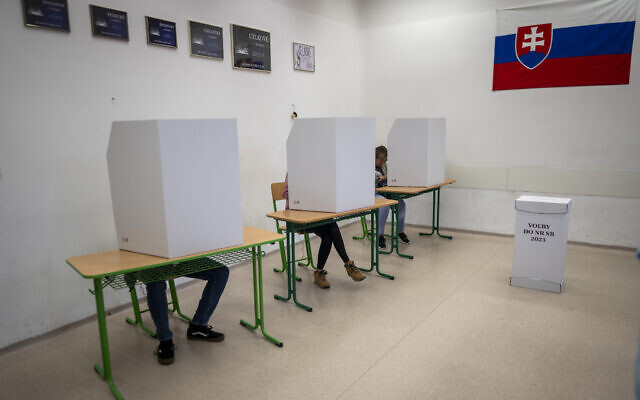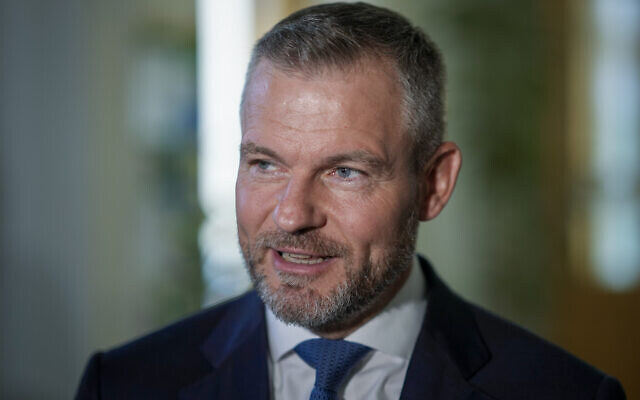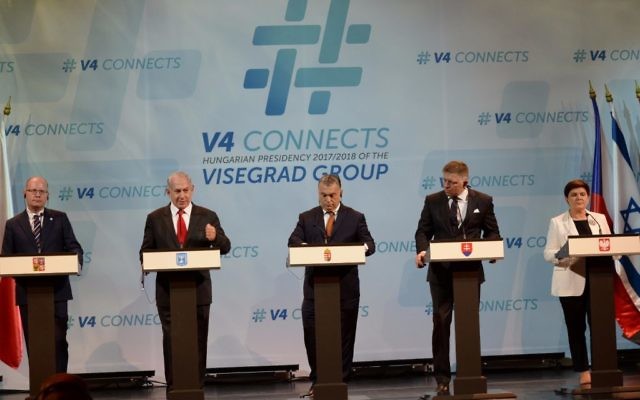A populist former prime minister and his leftist party won parliamentary elections in Slovakia, staging a political comeback after campaigning on a pro-Russian and anti-American message, according to almost complete results.
With results from 99.2 percent of some 6,000 polling stations counted by the Slovak Statistics Office early Sunday, former prime minister Robert Fico and the leftist Smer, or Direction, party led with 23.3% of the votes.
The election Saturday was a test for the small eastern European country’s support for neighboring Ukraine in its war with Russia, and the win by Fico could strain a fragile unity in the European Union and NATO.
Fico, 59, vowed to withdraw Slovakia’s military support for Ukraine in Russia’s war if his attempt to return to power succeeded.
The country of 5.5 million people created in 1993 following the breakup of Czechoslovakia has been a staunch supporter of Ukraine since Russia invaded last February, donating arms and opening the borders for refugees fleeing the war.
Get The Times of Israel's Daily Edition by email and never miss our top stories
With no party winning a majority of seats, a coalition government will need to be formed. The president traditionally asks an election’s winner to try to form a government, so Fico is likely to become prime minister again. He served as prime minister in 2006-2010 and again in 2012-2018.

Voters fill their ballots at a polling station in Bratislava, Slovakia, September 30, 2023. (Darko Bandic/AP)
A liberal, pro-West newcomer, the Progressive Slovakia party, was a distant second, with 17% of the votes.
The left-wing Hlas (Voice) party, led by Fico’s former deputy in Smer, Peter Pellegrini, was in third with 15%. Pellegrini parted ways with Fico after Smer lost the previous election in 2020, but their possible reunion would boost Fico’s chances to form a government.
Another potential coalition partner, the ultranationalist Slovak National Party, a clear pro-Russian group, received 5.7%.
Those three parties would have a parliamentary majority if they joined forces in a coalition government.
Hlas became Slovakia’s premier in 2018 after Fico had to step down amid nationwide protests following the murder of journalist Jan Kuciak and his fiancee.
Kuciak uncovered links between the Italian mafia and Fico’s government in his last article published posthumously.
Pellegrini told reporters it was not a good idea to have two former prime ministers in a single government, but “that doesn’t mean such a coalition is impossible.”

Former Slovak Prime Minister Peter Pellegrini addresses the media after voting at a polling station in Bratislava, Slovakia, September 30, 2023. (Darko Bandic/AP)
Fico opposes EU sanctions on Russia, questions whether Ukraine can force out the invading Russian troops and wants to block Ukraine from joining NATO.
He proposes that instead of sending arms to Kyiv, the EU and the US should use their influence to force Russia and Ukraine to strike a compromise peace deal.
Fico’s critics worry that his return to power could lead Slovakia to abandon its course in other ways, following the path of Hungary under Prime Minister Viktor Orbán and to a lesser extent of Poland under the Law and Justice party.
Hungary has been sanctioned by the EU for alleged rule-of-law violations and corruption, while EU institutions say Poland has been on a slippery slope away from the EU’s rule-of-law principles. Fico has threatened to dismiss investigators from the National Criminal Agency and the special prosecutor who deals with the most serious crimes and corruption.
Hungary also has — uniquely among EU countries — maintained close relations with Moscow and argued against supplying arms to Ukraine or providing it with economic assistance.
Fico repeats Russian President Vladimir Putin’s unsupported claim that the Ukrainian government runs a Nazi state from which ethnic Russians in the country’s east needed protection. Ukrainian President Volodymyr Zelensky is Jewish and lost relatives in the Holocaust.

Prime Minister Benjamin Netanyahu and the leaders of the Visegrad Group — Hungary, Slovakia, Czech Republic and Poland — in Budapest, July 19, 2017. (Haim Tzach/GPO)
Known for foul-mouthed tirades against journalists, Fico also campaigned against immigration and LGBTQ+ rights.
Voting for Smer in Bratislava, Eliska Spisakova said the Smer party was “the natural choice for the working poor, people like me.”
“I have a high opinion of [Fico], he focuses mainly on the needs of us Slovaks,” she told AFP.
Fico met with Prime Minister Benjamin Netanyahu at a July 2017 summit that also included Orban, the Czech Republic’s Bohuslav Sobotka, and Poland’s Beata Szydlo.
During a closed-door meeting in Budapest, Netanyahu was caught in a hot-mic moment harshly criticizing the European Union for its attitude towards Israel.
The election campaign was marred by particularly high rates of online disinformation, often targeting Progressive Slovakia chairman Michal Simecka, a European Parliament vice-speaker.
A study by the Globsec think tank last year showed a majority of Slovaks believe popular conspiracy theories.
The populist Ordinary People group, the conservative Christian Democrats and the pro-business Freedom and Solidarity also won seats in parliament.


